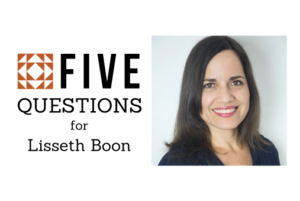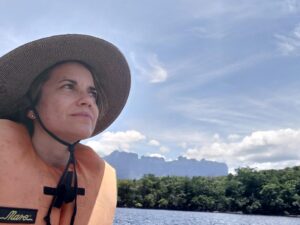“Malandro,” in Venezuelan Spanish, is a term used to describe any person, situation or action connected to crime.
It makes sense, then, that Venezuelan journalist Lisseth Boon used the word to describe mining exploitation and related crimes being committed in southern Venezuela.
In her first book, “Oro Malandro,” published by Dahbar Editorial, Boon dives deep into crimes ravaging the Venezuelan Amazon and the environmental, economic and community-related consequences of the Orinoco Mining Arc, a state project that opened almost 112,000 square kilometers of Venezuelan territory —an area larger than Guatemala— for mining activities.
 “This book is a compendium of all the crimes being committed in the Venezuelan Amazon through illegal mining linked to the Orinoco Mining Arc,” Boon told LatAm Journalism Review (LJR). “It is a state mega-mining project that is supposedly legal and was created to make use of the country’s natural resources. But it is clearly surrounded by illegality, because crimes are being committed here: ecocide, corruption, embezzlement, lack of accountability, massacres, human trafficking, forced disappearances and even modern slavery.”
“This book is a compendium of all the crimes being committed in the Venezuelan Amazon through illegal mining linked to the Orinoco Mining Arc,” Boon told LatAm Journalism Review (LJR). “It is a state mega-mining project that is supposedly legal and was created to make use of the country’s natural resources. But it is clearly surrounded by illegality, because crimes are being committed here: ecocide, corruption, embezzlement, lack of accountability, massacres, human trafficking, forced disappearances and even modern slavery.”
Boon is a Venezuelan investigative journalist with extensive experience in print and digital media in Venezuela, as well as in cross-border collaborative projects. Her investigations have earned national and international awards including the Gabriel García Márquez Award, the Inter American Press Association Award and the King of Spain International Journalism Prize.
Since April 2023, Boon has been part of the team at Armando.Info, the only media outlet in the country exclusively dedicated to investigative journalism.
In this edition of “5 Questions,” Boon discusses the process of writing a book based on investigative reporting, and the importance of continuing to document irregularities in a country like Venezuela.
The interview has been edited for clarity and length.
1. This is your first book. Why did this particular topic become a book?
Lisseth Boon: I had been thinking about writing this book for a long time. Since 2016, when I did my first report on gold and the Mining Arc, which was about the Tumeremo massacre—a joint reporting project between Runrunes, El Pitazo and Correo del Caroní.
Later came other investigations about gold trafficking, smuggling routes, the Dutch Caribbean route. We also worked on illegal mining in protected areas in the Canaima National Park. During the pandemic, we covered the advancing destruction of the Mining Arc and the situation of Indigenous communities.
After nearly a decade of reporting on this, there came a point where there were so many testimonies, anecdotes and interviews that often didn’t make it into the stories. So I said: we have to put this into a book.
There is also a great deal of ignorance about what is happening in the Venezuelan Amazon, not just outside Venezuela, as would be expected, but even inside the country.

Lisseth Boon is a Venezuelan investigative journalist with extensive experience in print and digital media in Venezuela, as well as in cross-border collaborative projects. (Photo: Courtesy)
2. How long did it take to write the book, and what was the process like?
LB: The writing and editing process took about a year and a half. When you tell yourself you’re going to write a book, you imagine you’ll have all the time in the world and that you will be on a writing retreat for three months in a room with a view of the ocean or a forest. Nothing could be further from reality.
Especially for a journalist in Venezuela who is also a mother. Not everyone understands the challenges and complexity of living in a country like Venezuela. I had to organize my time very carefully to be able to dedicate time to the book. That cost me a great deal. It was blood, sweat and tears—and though that may sound like a cliché, it is true. It is very hard.
When you write a book, another dilemma is wanting it to bring together and reflect everything you saw and processed during your years of reporting.
In my case, I was afraid the final product would not be this great compendium or would not include all the elements I needed to tell the story: the destruction of the Mining Arc, who is responsible and who the victims are.
In the end, I came to terms with the idea that you cannot include everything in the book. Otherwise, you will never finish. And you have to finish it just like a news report. There is a deadline, and you cannot keep writing forever. I couldn’t afford that luxury. There are many journalists who say, “Oh, I’m writing a book,” and never finish it.
3. What was the hardest part of the process, and how did you overcome it?
LB: Sergio Dahbar, a journalist and the editor at Dahbar Editorial, which has been publishing many investigative journalism titles, essays and books on political topics, called me one day and proposed the idea of the book—and I didn’t think twice.
It has been a very enriching and important learning process for me because it wasn’t an easy path. Writing a book is different.
I felt like I had a lot of material, a lot of data. I had traveled many times to the region. I had the knowledge, the experience and the approach to the topic. But this is not a news story or an investigative report. So, for me, it was also an exercise in shedding some of those rigid frameworks and patterns and the style we use when telling a story.
For example, writing in the first person was really difficult. Even at the last minute, I was still polishing that part because I found it hard to talk about myself and see myself as a protagonist. I’m from the old school, where you are never the protagonist of the story.
A workshop I did in 2023 on journalistic books, organized by the Gabo Foundation and led by Martín Caparrós in Madrid, also helped me a lot. It was a good step in the writing process. The workshop functioned like an editorial meeting because Caparrós doesn’t impose his opinion or method. He’s there facilitating everyone’s work. It also helped me to create an outline and a table of contents. There are so many interviews, documents, reports—it all has to be organized.
4. Investigative journalists focus on exposing the human, economic, environmental and social degradation you talk about in the book. But you cover Venezuela specifically. What differences do you see compared to other countries in the region?
LB: In other countries in the region—Colombia and Argentina, for example—there is a stronger tradition of publishing books by journalists.

“This book is a compendium of all the crimes being committed in the Venezuelan Amazon through illegal mining linked to the Orinoco Mining Arc,” Lisseth Boon told LJR. (Photo: Editorial Dahbar)
In fact, Colombia has the Simón Bolívar National Journalism Award, which includes a category for journalist of the year. In Argentina, publishing books is also a tradition, and some even become best sellers.
In Venezuela, we do not have that tradition, and there are many reasons for that. Among them: there are no publishing houses, the publishing industry is in decline, bookstores have closed, there has been a paper shortage, etc.
Also, in Venezuela, unfortunately, investigative journalism has very little impact. What is journalism generally supposed to do? Change something in society, create impact, lead to decisions being made based on the stories or revelations. But, unfortunately, that doesn’t happen in Venezuela.
5. You begin your book saying this investigation came from deep indignation but also from hope. What outraged you, and what gives you hope?
LB: This book is a compendium of all the crimes being committed in the Venezuelan Amazon through illegal mining linked to the Orinoco Mining Arc. It is a state mega-mining project that is supposedly legal and was created to make use of the country’s natural resources. But it is clearly surrounded by illegality, because crimes are being committed here: ecocide, corruption, embezzlement, lack of accountability, massacres, human trafficking, forced disappearances and even modern slavery.
There is also the issue of Indigenous peoples—in other words, crimes against Indigenous communities, who are the ancestral inhabitants of these lands. There are laws meant to protect them, but they are being completely disregarded.
What outraged me was two trips I took to southern Venezuela—one just before and one just after the pandemic. Only two years had passed, and yet the destruction of the Amazon had advanced dramatically. That moved me deeply.
It outraged me to see landscapes that were once green now taken over by mining, to see artisanal miners waist-deep in muddy water and open-pit mines where mercury is used. It also outraged me to see Indigenous people displaced from their land and culture, which is even worse.
That’s when I thought: How can this be stopped?
I always say we can’t give in to frustration, but must remember that what matters is that we’re documenting and creating a historical record of the times we’re living through.
So I think that’s one of the things that gives me satisfaction—that at least we’re doing this documentation. Writing books, leaving behind books, is a way to transcend. Not for us as journalists, but so the issues can transcend. And that’s where the hope lies: that thanks to this documentation, justice may someday be served.